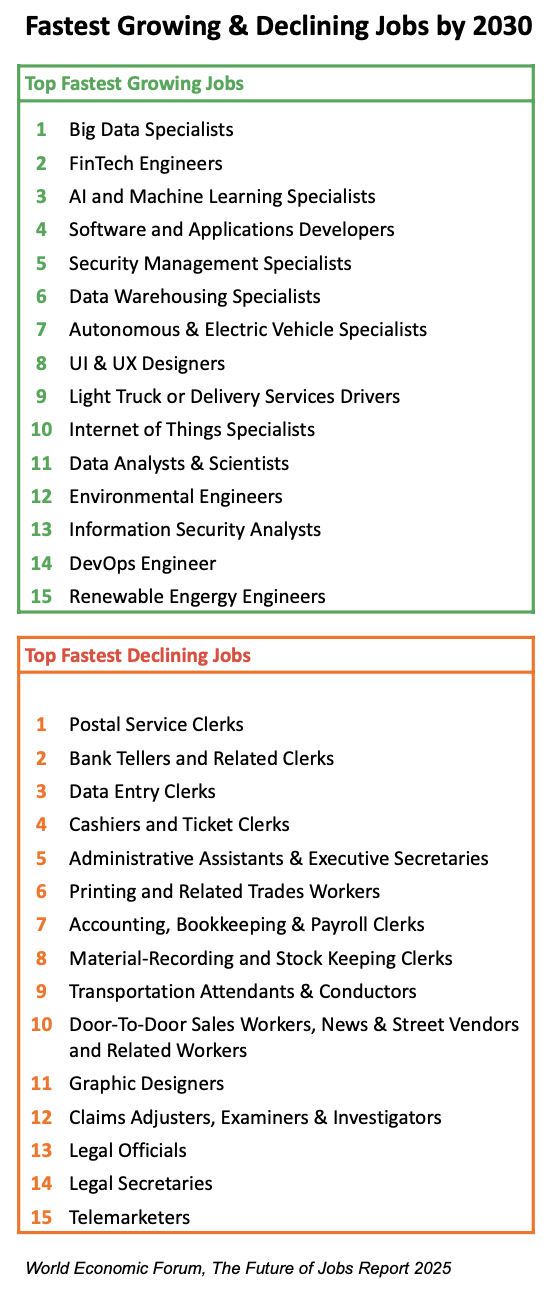
According to the World Economic Forum the Future of Jobs Report 2025, the key factors that will shape and transform the global labour market by 2030 are technological advancements, geopolitical shifts, economic uncertainties, demographic changes, and the transition to a greener economy.
Compiling insights from over 1,000 leading global employers representing more than 14 million workers, the report explores how these major trends will impact jobs, skills and workforce strategies.
Is your industry growing or in decline? While the table below shows some obvious trends in employment, there are also some surprises too.

The global job market is expected to undergo major transformations by 2030, driven by several interconnected factors:
Technological Advancements: Innovations in artificial intelligence (AI), robotics, automation, and energy systems will create new opportunities but also make some jobs obsolete. For instance:
- AI, big data, and cybersecurity skills will see high demand.
- Jobs in green energy, such as renewable energy engineers and electric vehicle specialists, will grow rapidly.
- Clerical jobs, such as cashiers, bank tellers, and data entry clerks, will face significant declines.Rising Cost of Living and Economic Shifts: Higher living costs and economic uncertainties are reshaping business strategies:
- Creativity, flexibility, and resilience will be critical skills as workers adapt to slower economic growth.
- While inflation is expected to moderate, slower growth could displace 1.6 million jobs globally by 2030.Green Transition: Climate-change initiatives are becoming top priorities for businesses:
- Jobs in renewable energy, environmental engineering, and sustainability-focused roles are expanding.
- Environmental stewardship has emerged as a key skill for the future workforce.Demographic Changes: Aging populations in wealthier countries and growing working-age populations in developing nations are reshaping labour markets:
- Healthcare jobs, such as nursing, will grow in response to aging populations.
- Expanding young populations in lower-income countries will increase demand for education professionals.Geopolitical and Geoeconomic Trends: Rising tensions and economic fragmentation are influencing trade and business strategies:
- Businesses may shift operations offshore or back to domestic locations, driving demand for cybersecurity and leadership skills.
Job Creation vs. Job Loss by 2030
From 2025 to 2030, global labour-market changes are expected to impact 22% of jobs:
170 million new jobs will emerge (14% of current employment), particularly in technology, healthcare, and education.
92 million jobs (8% of current employment) will be lost, mainly in roles impacted by automation, such as administrative and clerical positions.
Net job growth is projected at 78 million jobs globally (7% increase).
Frontline roles like farmworkers, delivery drivers, and construction workers will grow the most in terms of absolute numbers, while technology-related roles like AI specialists and fintech engineers will see the fastest percentage growth.
Skill Evolution and Workforce Transformation
By 2030, two-fifths of workers' skills will need updating or replacement. However, "skill instability" has slowed compared to past years:
- Key skills in demand include analytical thinking, creativity, resilience, flexibility, and lifelong learning.
- Manual and repetitive skills, such as physical dexterity and precision, will decline in importance.
To address skill gaps:
- 85% of employers plan to invest in up-skilling and re-skilling.
- Nearly 60% of workers will require training, with many being retrained within their current roles or redeployed to new ones. However, 11% of workers may miss out on needed training, risking unemployment.
Diversity, Equity, and Inclusion (DEI)
Diversity initiatives are gaining traction, with 83% of employers adopting DEI programs in 2025, up from 67% in 2023. These programs aim to:
- Expand talent pools by promoting inclusivity.
- Attract and retain workers by offering equal opportunities.
Business and Talent Strategies
To adapt to future trends:
- Companies plan to reallocate revenue toward wages, with over half anticipating higher spending on salaries by 2030.
- AI adoption will lead two-thirds of businesses to hire workers with AI expertise, while 40% expect to cut roles where automation is feasible.
Employers also emphasise employee well-being and career development as vital for attracting talent:
- 64% of employers prioritise health and well-being.
- Funding and support for training programs remain crucial public policies for boosting talent availability.
Final Outlook
By 2030, global labour markets will see rapid transformation driven by technology, climate goals, demographic shifts, and economic trends. While job opportunities in technology, healthcare, and green industries will grow, significant investments in re-skilling and inclusivity will be needed to address skill gaps and ensure equitable participation in the workforce.
